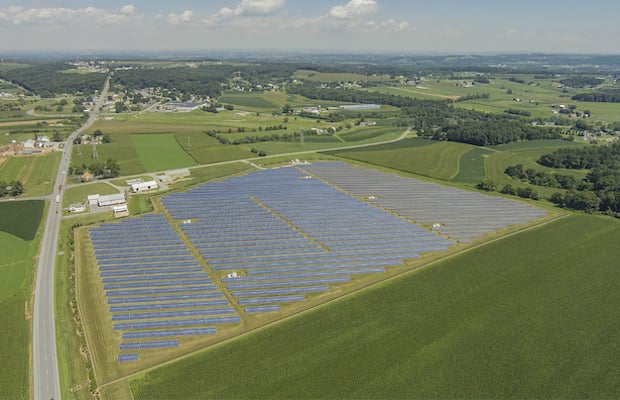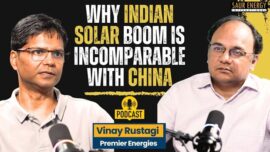
Delays in signing PSAs are a bottleneck in the growth of renewable energy capacity in India, jeopardising the 175 GW by 2022 target
Delays in signing power sale agreements (PSAs) are a bottleneck in the growth of renewable energy capacity in India, jeopardising the government’s renewable energy target of 175 gigawatts (GW) by 2022, dampening investor confidence and threatening the viability of projects, finds a new briefing note from the Institute for Energy Economics and Financial Analysis (IEEFA) and JMK Research.
The analysis finds that PSAs for nearly 19 GW of renewable energy capacity tendered by Solar Energy Corporation of India (SECI) are yet to be signed by state-owned distribution companies (discoms). Manufacturing-linked solar projects account for the majority (63 percent) of this capacity.
“This situation is having an adverse impact on the morale of project developers and investors and is slowing overall progress on renewable energy installation,” said co-author Vibhuti Garg, IEEFA Energy Economist, Lead India. “The missing link of PSAs affects the entire value chain. For example, without the assurance of the off-take of power for auctioned renewable energy projects, it becomes virtually impossible for developers to secure debt financing.”
Developers with SECI-tendered projects in their pipelines awaiting PSAs include Adani, Azure Power, ReNew Power and Greenko, which together form 78 percent of the total capacity in limbo, according to the note. On average, 37 percent of the entire (installed and pipeline) project portfolios of these prominent developers is SECI-tendered projects with non-executed PSAs.
“This significant share of capacity poses a substantial risk to the overall conversion of projects in the pipeline,” added Garg.
The note then points to the falling solar tariffs, driven by declining solar module prices, as a key reason for the Discoms’ reluctance to sign PSAs – and in a few cases attempts to renegotiate or renege on wind and solar power purchase contracts.
“In 2020 we saw solar tariffs hit a record low of Rs 1.99/kWh. Discoms are anticipating that solar module prices will decline further, leading to a reduction in future solar auction tariffs, so they are delaying signing PSAs at higher prices,” said co-author Jyoti Gulia, Founder – JMK Research. “However, with electricity demand now picking up and the imposition of 40 percent basic customs duty on solar modules, tariffs will be unlikely to fall further in the near-term.”
In fact, adds Gulia, with tougher penalties and enforcement of Renewable Purchase Obligations (RPO) under the draft Electricity Act (Amendment) Bill 2020, Discoms would have to procure power from renewable sources. The Ministry of Power’s Bill also proposes setting up a body to enforce contracts between generating, distribution or transmission companies.
The authors also suggest other measures to persuade Discoms to sign PSAs. These include setting a PSA signing deadline for all renewable tenders, requiring all Discoms to devise long-term plans estimating the amount of renewable energy capacity to be integrated into their power mixes each year, and SECI seeking assurances from discoms on purchase of power before planning auctions.
They also suggest evaluating the option of ‘tariff pooling’, where a weighted average is taken from tariffs discovered in SECI auctions over six months, to eliminate the advantage gained by Discoms that secure PSAs at relatively low tariffs. And tariff renegotiation – but only as a last resort option “under specific market conditions”.
“India must look for ways to speed up renewable energy installation to meet its national target of 175 GW,” said co-author Akhil Koshy Thayillam, Research Associate at JMK Research. “Expediting the signing of PSAs would not only free up a major share of ‘on-hold capacity’ but also reinvigorate the industry and the stakeholders who have been impacted.”
Recently, ICRA Ratings had stated in its analysis that policy support and tariff competitiveness factors are likely to continue driving investments in the renewable energy (RE) sector. However, on the flip side, the delays in the signing of the power purchase agreements (PPAs) and power sale agreements (PSAs) is a key downside risk in the near term.
Girishkumar Kadam, Co-Group Head, ICRA Ratings, said, “favourable factors like policy support and tariff competitiveness are likely to attract investments in the RE sector. Given the expected increase in solar tariff rates amid the imposition of basic customs duty (BCD) on imported solar PV cells and modules, the key downside risk for the sector in the near term arises from the risk of delays in the signing of the PPAs/PSAs. About 20 GW capacity tendered by the central intermediate procurers such as the Solar Energy Corporation of India Limited (SECI) and the NTPC Limited (NTPC) is yet to tie up PPAs/PSAs.”





























